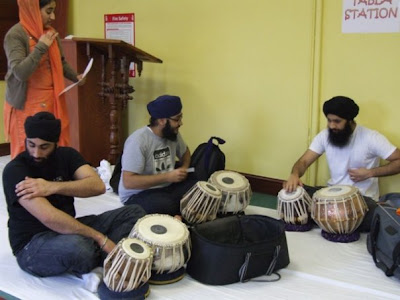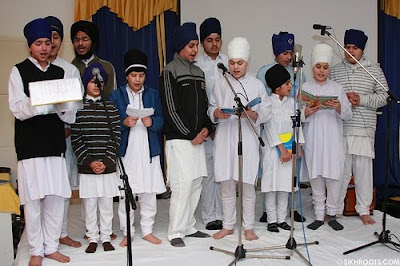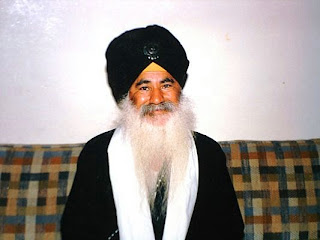 Reverend Charles Freer Andrew was a young Christian Anglican Priest from England during the British Raaj who was dear friend of the Sikhs. He had come to India as a priest, and later became a teacher, writer, journalist, translator, columnist, newspaper-correspondent, editor, educationalist, labour leader, mediator, activist, spokesman, and leader.
Reverend Andrews became the conscience of the British Raaj, questioning every tactic and strategy and demanding that all parties walk the straight line and do the right thing. He soon made enemies that wanted to stop his work. The British authorities found him to be a thorn in their side - an Englishman constantly questioning their motives and their methods. Some saw him as betraying his land of birth, even the very Faith he had been sent to preach. It didn't help when he offered to resign from his Church and priesthood. On the other hand, many Indians worried if he was a British spy.
Andrews began by attacking the very methods of Christian proselytization in India - and don't forget that he was a priest sent to India to help convert the masses! He questioned the Western and Eurocentric view of Christianity, and demanded that it embrace humanity, not just what he himself referred to as the "white races". It didn't take long before he went further and introduced the revolutionary idea that all Indians were to be treated as equals with the rest of the citizens of the Empire! He argued they were British subjects. He began to publicly sell the idea that the only way Indians would ever achieve equality would be through complete independence from Britain.
Whilst Indians became politically active to gain independence, Reverend Andrews kept the British authorities on their toes by fighting for the rights of Indians in the colonies - in South Africa, Fiji, Mauritius, Guyana, even Canada. And in India, for the rights of women, the so-called backward castes, and so on.
Reverend Andrew was stopped from entering the Panjab, however some how he gained accessed to the Panjab. The things he witnessed in Panjab were written and published to ensure that the world, in particular people living in Britain, knew what was happening.
Reverend Charles Freer Andrew was a young Christian Anglican Priest from England during the British Raaj who was dear friend of the Sikhs. He had come to India as a priest, and later became a teacher, writer, journalist, translator, columnist, newspaper-correspondent, editor, educationalist, labour leader, mediator, activist, spokesman, and leader.
Reverend Andrews became the conscience of the British Raaj, questioning every tactic and strategy and demanding that all parties walk the straight line and do the right thing. He soon made enemies that wanted to stop his work. The British authorities found him to be a thorn in their side - an Englishman constantly questioning their motives and their methods. Some saw him as betraying his land of birth, even the very Faith he had been sent to preach. It didn't help when he offered to resign from his Church and priesthood. On the other hand, many Indians worried if he was a British spy.
Andrews began by attacking the very methods of Christian proselytization in India - and don't forget that he was a priest sent to India to help convert the masses! He questioned the Western and Eurocentric view of Christianity, and demanded that it embrace humanity, not just what he himself referred to as the "white races". It didn't take long before he went further and introduced the revolutionary idea that all Indians were to be treated as equals with the rest of the citizens of the Empire! He argued they were British subjects. He began to publicly sell the idea that the only way Indians would ever achieve equality would be through complete independence from Britain.
Whilst Indians became politically active to gain independence, Reverend Andrews kept the British authorities on their toes by fighting for the rights of Indians in the colonies - in South Africa, Fiji, Mauritius, Guyana, even Canada. And in India, for the rights of women, the so-called backward castes, and so on.
Reverend Andrew was stopped from entering the Panjab, however some how he gained accessed to the Panjab. The things he witnessed in Panjab were written and published to ensure that the world, in particular people living in Britain, knew what was happening.
In September 1922 there was a peaceful protest against the Mahant Sunder Daas who disrespected Guru Ka Bagh Gurdwara. He was given full support by the police who severely beat Sikhs with bamboo sticks. In all, 5606 Sikhs are arrested, 1500 seriously injured and dozens killed during a period of 3 months. Andrews witnessed the brutality and inhumanity and stated that he “saw hundreds of Christs suffering the cross daily”. Eventually the British government conceded and handed back control of the Gurdwara to the Sikhs. Below is the eye-wtiness account of Rev. CF Andrews of the Guru-Ka-Bagh Morcha (protest):
It was a sight which I never wish to see again, a sight incredible to an Englishman. There were four Akali Sikhs with black turbans facing a band of about two dozen policemen, including two English officers. They had walked slowly up to the line of police just before I had arrived and they were standing silently in front of them at about a yard’s distance. They were perfectly still and did not move further forward. Their hands were placed together in prayer and it was clear that they were praying. Then, without the slightest provocation on their part, an Englishman lunged forward the head of his lathi [staff] which was bound with brass. He lunged it forward in such a way that his fist which held the staff struck the Akali Sikhs, who were praying, just at the collar bone with great force. It looked the most cowardly blow as I saw it struck and I had the greatest difficulty in keeping myself under control... The blow which I saw was sufficient to throw the Akali Sikh and send him to the ground. He rolled over and slowly got up and at once faced the same punishment again. Time after time, one of the four who had gone forward was laid prostrate by repeated blows, now from English officers and now from the police who were under their control.... The brutality and inhumanity of the whole scene was indescribably increased by the fact that the men who were praying to God had already taken a vow that they would remain silent and peaceful in word and deed. The Akali Sikhs who had taken this vow, both at the Golden Temple and before starting and also at the shrine of Guru-ka-Bagh were...largely from the army. They had served in many campaigns in Flanders, in France, in Mesopotamia and in East Africa. Some of them at the risk of their own safety must have saved the lives of Englishmen who had been wounded. Now they were falling to the ground at the hands of the English officials serving in the same government which they themselves had served. ...I saw no act, or look of defiance. It was a true martyrdom, a true act of faith... There has been something far greater in this event than a mere dispute about land and property. It has gone far beyond the technical questions of legal possession or distraint. A new heroism, learnt through suffering, has arisen in the land. A new lesson in moral warfare has been taught to the world.... It reminded me of the shadow of the Cross. ....It was very rarely that I witnessed any Akali Singh, who went forward to suffer, flinch from a blow when it was struck. Apart from the instinctive and slight shrinking back, there was nothing, so far as I can remember, that could be called a deliberate avoidance of the blows struck. The blows were received one by one without resistance and without a sign of fear. ... A new heroism, learnt through suffering, has arisen in the land. A new lesson in moral warfare has been taught to the world... It was very rarely that I witnessed any Akali Sikh, who went forward to suffer, flinch from a blow when it was struck. Apart from the instinctive and involuntary reaction of the muscles that has the appearance of a slight shrinking back, there was nothing, so far as I can remember that could be called a deliberate avoidance of the blow struck. The blows were received one by one without resistance and without a sign of fear." Andrews, C.F., Manchester Guardian, February 15 and February 24, 1924.



















































